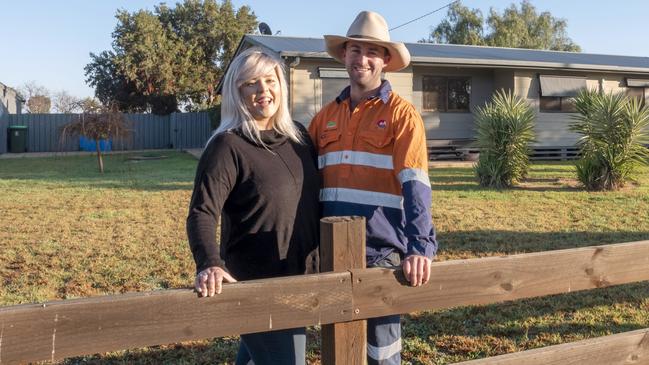Farmers put on their mining hats to ride out hard times
Nine months ago, James Chandler drove six hours south to the city of Parkes, where he found a lifeline in unfamiliar terrain.

James Chandler grew up in the tiny village of Louth, on the eastern side of the Darling River, where his family has spent the past 10 years raising sheep and goats on a sprawling acreage.
Nine months ago, when a lack of rain brought the farm to the brink of ruin, he packed up a car and drove six hours south to the city of Parkes, where he found a lifeline in unfamiliar terrain: the mining industry.
Mr Chandler, 25, is not alone. He is one of dozens of farmers moving off the land in search of jobs in copper and coalmines, processing plants, machine maintenance or mining back offices. The stable salary provides not just relief but certainty.
“It’s been life-saving,” said Mr Chandler, who now has a job with Northparkes, a copper and goldmining company. “I didn’t know a thing about mining and I felt really uneasy about it. Moving to a bigger town and into a whole industry was daunting, but after about three weeks I felt settled and happy.”
Northparkes is one of numerous mining companies recruiting farmers, an arrangement that plugs a skills shortage using men and women renowned for their work ethic.
For many farmers, the lack of rain has posed an agonising conundrum: whether to stay on the land and wait for a miracle, or leave behind their livelihoods.
Mining, it seems, provides a solution of sorts. At Peabody Energy’s Wilpinjong mine, northeast of Mudgee, a recent survey of workers found almost 20 per cent — about 100 people — identify as farmers who are working full- or part-time to support themselves through the drought. Often their partners take jobs too, alternating morning and night shifts so one can stay home and tend to the land.
“If I didn’t have the job at Wilpinjong it’d definitely be a struggle,” said Chris Barnett, a cattle farmer who drives one hour each way to his role at the mine’s coal-handling and preparation plant.
“My mining income allows us to breathe and gives us that little bit of cushion so we’re not relying on selling cows every week to support the family.”
Farming and mining, both labour-intensive industries, tended to complement each other in other ways, said Blair Jackson, Wilpinjong’s general manager. He, too, is a farmer. “Not only do they (farmers) have a good understanding of local land and soil conditions, they also work incredibly hard and really know their way around machinery.”
Since about the middle of last year, the NSW government has responded to drought conditions with a range of aid plans, subsidies, interest-free loans and allowances for agriculture workers and regional businesses. In August, the government added training courses that would upskill farmers in auto electrics, drone operations, bookkeeping, heavy vehicle use, and other non-farming fields.
An hour’s drive south of Parkes, in West Wyalong, four farmers have found casual work with Hort Enterprises, which provides maintenance services to an Evolution Mining-owned site that extracts gold on Lake Cowal.
“Normally living in a little country town, it’s hard to get labour,” said Jared Reid, a Hort Enterprises spokesman. “We find that a lot of farmers have previously done a trade or been very handy guys because they’re that way inclined,” Mr Reid said.
Further north, in the town of Gilgandra, about 60 farmers and agriculture workers have signed up to receive training and qualify to work in alternative industries.
Mining in general supports almost 29,000 jobs across the state, according to Deputy Premier John Barilaro, the minister for Regional NSW. In the 2018-2019 financial year the sector contributed almost $2.1 billion to the state’s economy, but this number is expected to be revised down, according to the recent half-yearly review of the NSW budget. Mr Barilaro praised the mining community for stepping in to recruit farmers.
“Regional communities are stronger when they have a range of profitable solutions to support them and these companies are proving just how much mining and agriculture complement one another,” Mr Barilaro said.

To join the conversation, please log in. Don't have an account? Register
Join the conversation, you are commenting as Logout